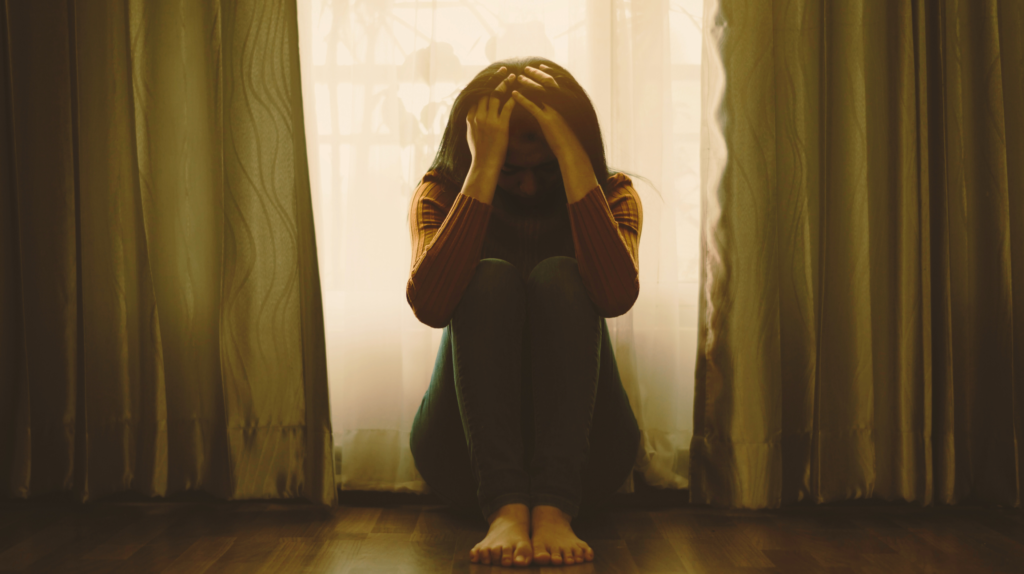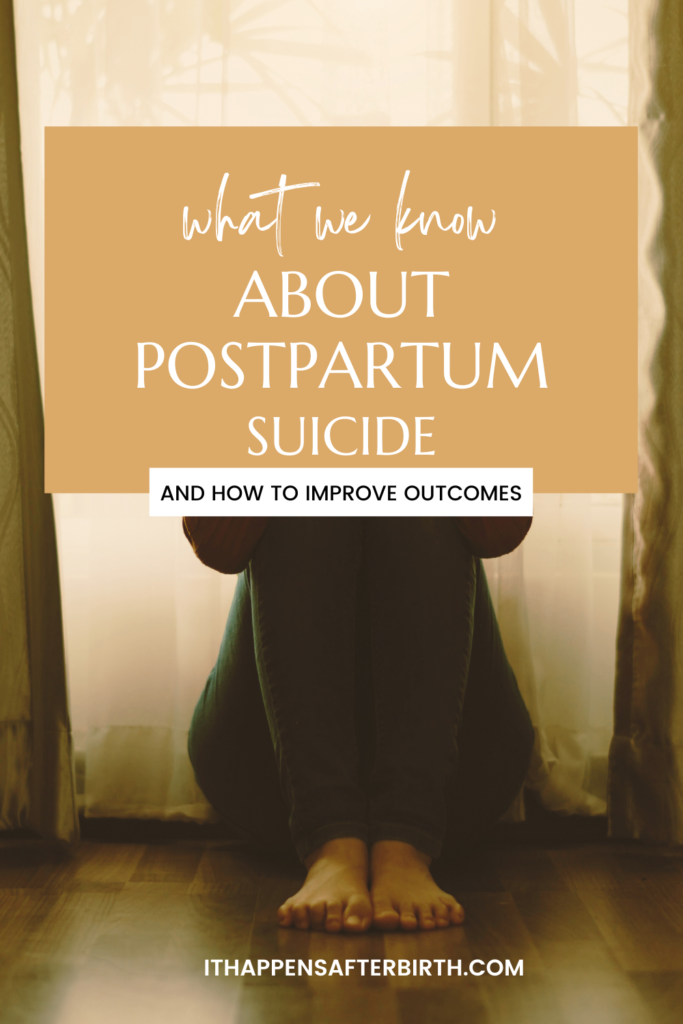
As postpartum mental health awareness has risen, we’ve begun to drop the stigma surrounding things like depression or anxiety. But what we aren’t talking about are the rates of maternal suicide among postpartum women.
(Note: this post talks about suicide and suicidal ideation.)
What do we know about the numbers?
The CDC does not include suicide deaths in their maternal mortality statistics, labeling them as “accidental or incidental”.
But other sources, such as Maternal Mortality Review Committees, have compiled enough data to give us an idea of how many women are affected.
According to these sources, we know that:
- Suicide is a leading cause of death among postpartum women
- It accounts for at least 8.8% of postpartum deaths
- Rates of perinatal (pregnancy and postpartum) suicide remain high even as other common causes of maternal mortality show a decline
- Suicide rates are higher between 6-12 months postpartum
What are the risk factors?
It’s difficult to isolate the risk factors for suicide, as thoughts of suicide or self-harm are more common among risk factors and don’t always lead to suicide.
Some research shows that postpartum women in lower-income countries or households have a higher rate of suicide. (As of right now, the United States is one of the only higher-income countries that is seeing a rising rate of maternal suicide.)
Developing a postpartum mood disorder, such as depression, anxiety, or psychosis, can also put women at risk. So can substance abuse (whether current or in their personal history). Women diagnosed with a postpartum mood disorder are at a significantly higher risk for suicidal ideation and self-harm.
Other risk factors include:
- Younger age demographic
- History of abuse in childhood
- Domestic violence
- Being single/unmarried
- lack of social support
What is it like for women struggling with this?
Stigma still surrounds the mental health of parents. Especially when it comes to serious disorders such as depression or postpartum psychosis. And even more so when it comes to maternal suicide.
Interestingly, studies show that among the women who attempted or committed suicide in the first year postpartum, the majority of them had at least one contact with a professional regarding their mental health.
But mental health resources as a whole remain scarce for postpartum women. Screening for depression, suicidality, or thoughts of self-harm is not standard practice during prenatal or postpartum visits. Even when screening takes place and risk is identified, most women are not connected with the support that they need.
OB-GYNs, midwives, and many other medical professionals who see postpartum women are not trained in how to diagnose or treat mental health. They also often do not have a strong referral network to help women who are struggling or at risk.
With the structure of maternal health care, many women do not feel comfortable sharing that they’re experiencing suicidal thoughts or thoughts of self-harm. If they do, they may not get any validations for their concerns.
Women could also hesitate to share their concerns because they’re afraid of how they will be treated, that their child(ren) will be taken from them, or that they will cause problems for their family and friends.
What support is out there?
As support for pregnant and postpartum women’s mental health grows stronger, the conversation about self-harm and maternal suicide is starting to gain traction.
This means that more support options for women struggling with suicidal thoughts (or who have attempted suicide) are underway.
Medical providers are understanding more and more how important it is to pay attention to parents’ mental health and screen for mental health disorders during pregnancy and postpartum.
Mothers who are diagnosed with postpartum depression are at higher risk for suicide attempts, so this is an important first step. (But not enough on its own.)
Also, a pill specifically for postpartum depression is now becoming available for moms. This is another important step in mental health treatment of parents.
Organizations like Postpartum Support International are working to raise awareness for maternal suicide prevention. They offer support groups for moms who are struggling, as well as events to increase understanding of what new parents have to face.
We still have a long way to go to offer adequate support for all struggling new parents. But we are beginning to make strides to offer real help for those experiencing depression or suicidality.
Are we seeing improvements?
Key word to the sentence above is “beginning.”. We are a long way from where we need to be.
Studies show that in the last decade, the number of moms who have attempted suicide has nearly tripled.
And there is reason to believe that the actual number of those struggling with thoughts of suicide or self-harm is vastly under-reported.
Maternal suicide is a crisis in health care that needs to be addressed- however uncomfortable it may feel to do so.
Lives depend on it. It isn’t just for the health of moms, but the health of their babies and their entire family.
How can we improve outcomes for mom struggling with this?
If we want to improve outcomes for mothers experiencing suicidal thoughts, we need to foster an environment that allows them to find the help they need.
We need a higher focus on not just physical, but mental health during pregnancy and postpartum.
We need a tighter referral network between medical providers who can identify at-risk patients and mental health professionals who can treat them.
And, we need to continue to lessen the stigma surrounding the mental health struggles of new parents. We also need to increase social support for new parents. The saying “it takes a village” is true- we need the support of our community to grow strong and healthy parents.
Increased postpartum visits to discuss physical and emotional wellness after birth can also help improve outcomes for moms. Too often moms are restricted to only one or two wellness visits after birth- and are left completely on their own after six weeks.
We won’t see changes to maternal health care overnight. But if we continue to raise awareness and work to effect change on a societal and professional level, we can lower the rates of maternal suicide.
If you are anyone you know is struggling with thoughts of suicide, please call the National Suicide and Crisis Hotline at 988.

